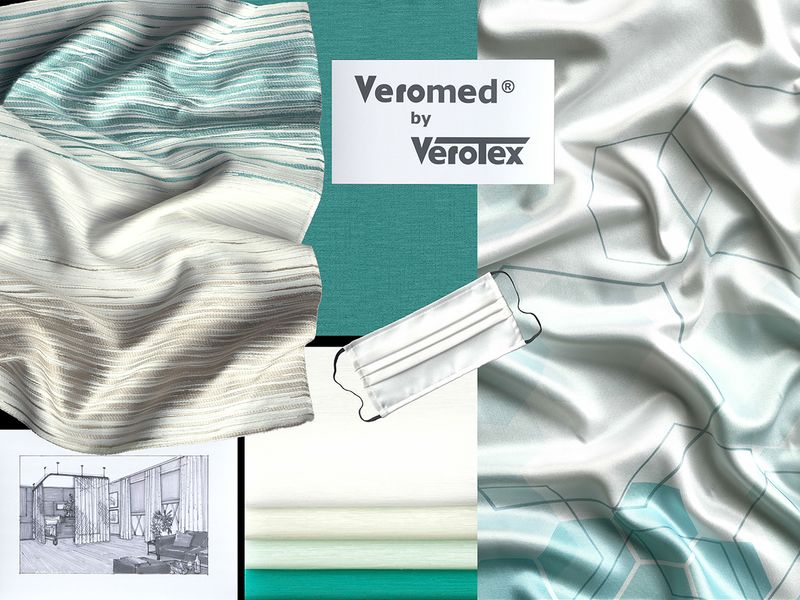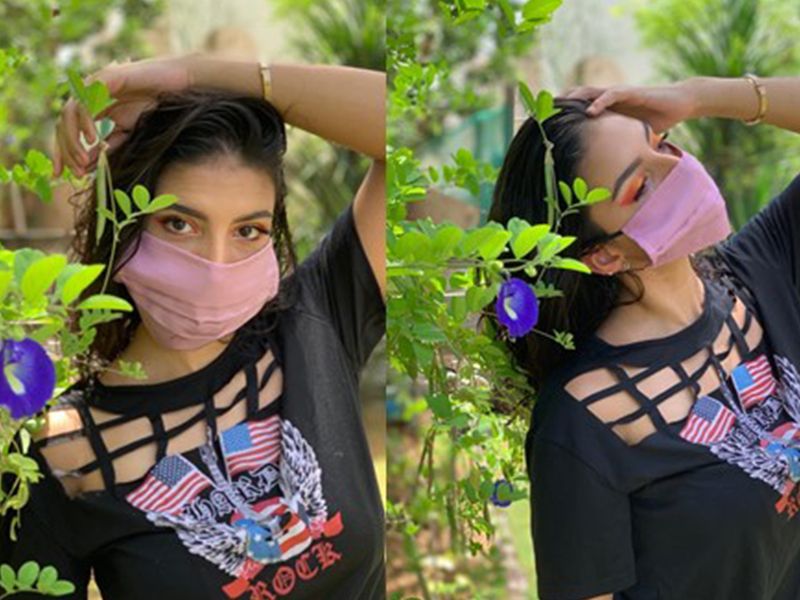Can you give us a brief history of Verotex?
Verotex weaving mill was founded 27 years ago as a result of a yarn we developed in our spinning mill. The intention of our founder had always been, and still is safety, comfort and kindness to the environment. It started with a range of fabrics, including Verosafe, which is PVC-free, inherently flame retardant and has no additional chemical finishes.
At that time all roller blinds and vertical blind fabrics needed a coating to stiffen them, and we were the first company to combine design and safety with environmentally friendly fabrics. All our fabrics are produced at our facility in Germany to secure consistent quality and smooth logistics. From our first range, Verosafe, we then developed Veroglim (high reflection screens for computer working stations), Veroflex (mostly blackout coated fabrics) and Veromed, to the highest industry standards.

Image Credit: Supplied
How did the idea of Veromed fabrics form?
Veromed was developed five years ago as a direct result of our market research in the UAE and the huge demand for antimicrobial fabrics in the healthcare sector. The fabric contains a biocidal product. It’s also called silver ion technology that is built into the fibre polymer to counter the growth of microorganisms in or on the fabric. It is machine washable up to 60°C with fine detergent without losing the bioactive character. Its brand name is Veromed Trevira CS Bioactive and this fibre is patented.
The idea was to come up with a fabric that fulfilled the needs of the healthcare sector, meaning it had to be antimicrobial, flame retardant and durable, but which should be not affected by washing or usage. Veromed offers all the possible safety — viruses and bacteria cannot grow on that fabric, it is flame retardant, it does not use any additional coatings or finishes, it is washable up to 60°C, all while completely free of any toxic substances. With a light fastness of six to seven it never fades, retains its shape even under the toughest of conditions and is offered in many different designs and colours.
These fabrics can be particularly used for cubicle beds and window curtains as well blind systems in hospitals, which are constantly being touched by so many different people all day. The Veromed material makes it possible to develop appropriate measures to prevent cross-contamination in medical environments.

Image Credit: Supplied
How does the fabric guarantee the death of Covid-19 viruses on the surface?
Trevira CS Bioactive is a fibre made of a polymer that has a silver ion embedded in its molecular structure. This silver ion makes it impossible for bacteria and viruses to grow in fabrics that are woven out of Trevira CS Bioactive fibre. Also, all our fabrics are tried at independent institutes in Europe. We have tested this fabric range for several standards in flame retardancy and an extensive range of bacteria and viruses, including Covid and Pox viruses.
What can these fabrics be used for? Are they only for hospital use?
Veromed fabrics are presently used mainly for the health care sector, while Verosafe is usually used for commercial projects, such as offices, hotels and schools. But times have changed. If there is a chance to improve safety, why not use it? Veromed also has other benefits, for instance, bacteria cannot grow on it.
The fabric also does not develop mold, or carry the typical moldy odours you find in damp, old houses or hotels due to Chloroanisole (a bacterium that develops because of humidity).
That’s not all, our PVC-free fabric range of Veromed and Verosafe is not to be underestimated. In case of fire, PVC releases a harmful chlorine gas (dioxin) and you have only few minutes to leave the premises before suffering serious injuries.
How are your reusable face masks different from the ones available in the market?
In the beginning of February, when WHO declared the Coronavirus pandemic, the Dubai government didn’t have enough safety equipment. We, as Verotex Gulf, felt obliged to react and give something back to the country to protect its citizens. We started producing the reusable Veromed face masks, for which we got a lot of support from our partner the Dubai Airport Free Zone Authority (DAFZA).
The idea of making comfortable masks, using a fabric that is already tested against bacteria and viruses and does not have any harmful substances made sense. The standard disposable masks, which are being promoted and sold to the general public are made for non-intensive medical usage and are for one-time use only. But once you put it on, or touch it in case you come in contact with the virus, contamination will spread all over the mask. This seemed too risky. Furthermore, you have to change these masks after three to four hours. This is a few million masks each day, so what about the waste? When it comes Veromed masks, you need two to three, so you can rotate them with your laundry.
What tests were conducted to prove the efficacy of the product?
We test all our products in independent high-grade institutes in Germany, France and the UK. The trials have been conducted for flame retardancy, antimicrobial and antivirus standards such as DIN4102, EN1021, ISO18184.2019, and Oekotex 100.
What’s next for the company?
In 2021, we will be launching our new range, VeroBlue (named after our home, The Blue Planet), which is made of 100 per cent recycled material, and features all the attributes that make our range of fabrics such a great choice. Furthermore, we will also launch VeroDur, a range of super durable fabrics for outdoor applications, which are also 100 per cent PVC-free.
